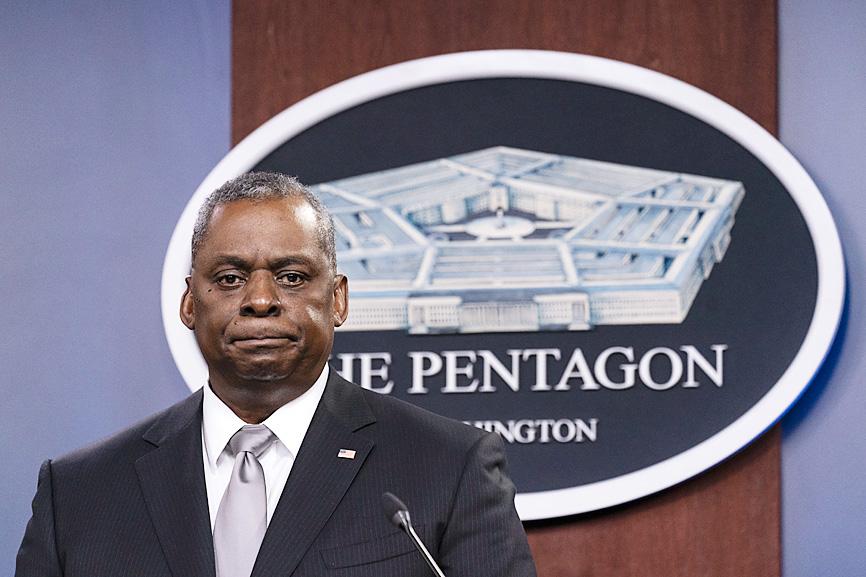The US encourages Taiwan to invest in defense and obtain asymmetric defense capabilities, US Navy Admiral Philip Davidson said on Thursday.
Davidson, commander of the US Indo-Pacific Command, made the remark in a videoconference on defense matters hosted by the American Enterprise Institute think tank.
“China is positioned to achieve overmatch” in its military capability by 2026, he said.

Photo: AP
When Beijing is able to, it would “likely choose to forcibly change” the balance of power in the Indo-Pacific region, “and I would say the change in that status quo could be permanent,” he said.
“China seeks a new world order, one with Chinese characteristics, as they often said, where Chinese national power is more important than international law,” he added.
In response to questions, Davidson said that China has stepped up activities with military aircraft and warships around Taiwan, including intrusions into Taiwan’s air defense identification zone and coast guard vessels near the Diaoyutai Islands (釣魚台).
It is crucial for the US to assist and encourage Taiwan to invest in national defense with an emphasis on obtaining defense capabilities and the means to deter an attack, in addition to arms sales and assisting Taiwan in making a strategy of deterrence a reality, he said.
Meanwhile, writing in a document entitled “Memorandum for All Department of Defense Employees,” US Secretary of Defense Lloyd Austin on Thursday named China as the “pacing challenge” to US national security.
Highlighting challenges confronting the US, Austin said that department officials and employees must deal with the “proximate” hurdles stemming from the COVID-19 pandemic and China.
Other priorities for the department were to address advanced and persistent threats posed by Russia, North Korea and Iran, and by extremist groups in the Middle East, Africa, and south and central Asia; to modernize the department; and to tackle the climate crisis.
“The department will prioritize China as our No. 1 pacing challenge and develop the right operational concepts, capabilities and plans to bolster deterrence and maintain our competitive advantage,” he said.
“We will ensure that our approach toward China is coordinated and synchronized across the enterprise to advance our priorities, integrated into domestic and foreign policy in a whole-of-government strategy, strengthened by our alliances and partnerships, and supported on a bipartisan basis in Congress,” he added.

Right-wing political scientist Laura Fernandez on Sunday won Costa Rica’s presidential election by a landslide, after promising to crack down on rising violence linked to the cocaine trade. Fernandez’s nearest rival, economist Alvaro Ramos, conceded defeat as results showed the ruling party far exceeding the threshold of 40 percent needed to avoid a runoff. With 94 percent of polling stations counted, the political heir of outgoing Costa Rican President Rodrigo Chaves had captured 48.3 percent of the vote compared with Ramos’ 33.4 percent, the Supreme Electoral Tribunal said. As soon as the first results were announced, members of Fernandez’s Sovereign People’s Party

MORE RESPONSIBILITY: Draftees would be expected to fight alongside professional soldiers, likely requiring the transformation of some training brigades into combat units The armed forces are to start incorporating new conscripts into combined arms brigades this year to enhance combat readiness, the Executive Yuan’s latest policy report said. The new policy would affect Taiwanese men entering the military for their compulsory service, which was extended to one year under reforms by then-president Tsai Ing-wen (蔡英文) in 2022. The conscripts would be trained to operate machine guns, uncrewed aerial vehicles, anti-tank guided missile launchers and Stinger air defense systems, the report said, adding that the basic training would be lengthened to eight weeks. After basic training, conscripts would be sorted into infantry battalions that would take

EMERGING FIELDS: The Chinese president said that the two countries would explore cooperation in green technology, the digital economy and artificial intelligence Chinese President Xi Jinping (習近平) yesterday called for an “equal and orderly multipolar world” in the face of “unilateral bullying,” in an apparent jab at the US. Xi was speaking during talks in Beijing with Uruguayan President Yamandu Orsi, the first South American leader to visit China since US special forces captured then-Venezuelan president Nicolas Maduro last month — an operation that Beijing condemned as a violation of sovereignty. Orsi follows a slew of leaders to have visited China seeking to boost ties with the world’s second-largest economy to hedge against US President Donald Trump’s increasingly unpredictable administration. “The international situation is fraught

GROWING AMBITIONS: The scale and tempo of the operations show that the Strait has become the core theater for China to expand its security interests, the report said Chinese military aircraft incursions around Taiwan have surged nearly 15-fold over the past five years, according to a report released yesterday by the Democratic Progressive Party’s (DPP) Department of China Affairs. Sorties in the Taiwan Strait were previously irregular, totaling 380 in 2020, but have since evolved into routine operations, the report showed. “This demonstrates that the Taiwan Strait has become both the starting point and testing ground for Beijing’s expansionist ambitions,” it said. Driven by military expansionism, China is systematically pursuing actions aimed at altering the regional “status quo,” the department said, adding that Taiwan represents the most critical link in China’s